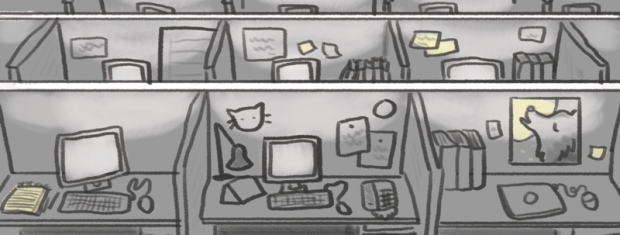“These Silicon Valley firms sometimes self-destruct, I am discovering, much like supernovae.”
The empty cubicles of the Discarded remain untouched, their gray, padded walls still displaying the cartoons, awards, and post-it notes of their late occupants. Computers stand inert beside telephones patiently blinking undelivered messages. Ads announcing revolutionary product launches droop from their push pins.
I walk among these cubicles thinking of Heisenberg’s living dead cats. If an employee is terminated but unaware of it, does the Cosmos consider him employed or unemployed? I tiptoe past the deserted cubicle of Herman Brandwine, a pale, broad-hipped software analyst with a frizzy hairline. Herman had seemed to visit the restroom on the same schedule as I did, homing in on his forked male symbol with an urgent, duck-footed gait. Several times, he and I had nearly collided.
Penny Dahlen, an accounts payable clerk, has left behind the wolf posters that decorated her cubicle. The yellow eyes of the abandoned wolves track passersby with a cornered, territorial glare. Penny had had a lopsided grin and long, oily blonde hair. Her nasty ex-husband Royal had stalked her, lurking in the bushes outside the building or in the parking lot, ranting of betrayal, orgies and child abandonment.
These Silicon Valley firms sometimes self-destruct, I am discovering, much like supernovae: a period of instability will suddenly culminate in a massive ejection of employees, accompanied by a spewing of gaseous press releases. In the coming months, a smaller, denser entity will emerge, composed of odd particles and hierarchies. Or the company might continue to decay, vanishing at last into a sort of black job hole, pulling other firms into its vacuous heart.
To me though, the layoffs seem more ethnic cleansing than cosmic event. Secret cadres meet, rumors fly. Work grows random, minimal. Everywhere, people gather in tense, whispering little knots, exchanging questioning looks and shrugs. A pervasive sense of helplessness causes some to grow feverishly self-indulgent, wasting money on frivolities and sauntering in late from lunch, as if to beckon fate. Others, bitter, declare themselves unappreciated, conspired against. Most simply wait numbly. Every end is a beginning they remind one another, without conviction.
When the fatal day arrived, many simply disappeared with Stalinesque suddenness. Others were plucked away in mid-task by their managers, never to reappear. From my window, I watched blank-faced security guards escort dazed former colleagues through the parking lot, ducking their heads like mob informants.
My group, Marketing Communications, had warred with Corporate Communications. Now, outmaneuvered in the boardroom, we fell, our Director banished to the Gulag of Systems Administration, our functions outsourced. I alone survived, shielded perhaps by my indifference.
Nobody really plans a career in Marcom anyway. Marcom is, rather, where we end up—aspiring actors and singer-songwriters, shell-shocked English teachers, addled psychology majors, law school dropouts and starving would-be novelists like myself. We churn out content, as they call it—or worse, text. We serve the insatiable need of technology to be understood, to be felt; to speak in the human tongue even as it eclipses us with its own spate of languages.
The company’s latest slogan is “Reaching New Horizons.” In the advertisements, server hardware glows amid towering cumulus or hangs in a star-littered cosmos. Back on earth, heroic disk drives conquer Half Dome or rest atop Venezuelan tepuis. I can hardly watch a sunset without imagining some computer part imposed on it.
Tall, thin, and dark-haired, with round hazel eyes, I look like a Modigliani but yearn to be a Klimt—sensual, powerful, profane. I paint my eyes into an upward slant and affect a Klimtish hairstyle, but a vague, rather mournful look persists.
Day after day, I type away listlessly at an email intended to rebuild morale: The layoffs have so lightened the company, I write, that it has gone airborne, soaring into profitability! I assure myself that nobody will actually read this clatfart, and even if they do, will not believe it.
To preserve my sanity, I surf the Web blatantly, reading Moby Dick, and visiting a message board for survivors of Strep A, the flesh-eating bacteria. Some of its victims had merely barked their shins or pricked a finger before being half-devoured by the opportunistic germ. White whale, seamstress or marcom, our fates await the agenda of some other creature.
“This is going to hurt, Margi,” warned Ron, “but I have to tell you. I’ve met someone.” The air between us sagged under the weight of his confession. “You don’t know her. She’s in my chemistry class. I didn’t plan this.”
“I was going to move to San Jose anyway,” I lied. “The commute is killing me.”
He blinked. “When were you planning to tell me?”
“I… was just waiting for the chance.”
Every morning I drove from Santa Cruz to San Jose over Highway 17, a sinuous black python winding through mountains of oak and redwood. The highway is poorly engineered, with blind curves, precipices, and straight descents that terminate in tight loops. Commuters share the road with double-jointed gravel trucks and gasoline tankers. An inattentive, complacent, or inexperienced driver might round a curve to see (perhaps the last thing he ever did see) the rear end of an elephantine cement tub complete with girlie mudflaps and “Higher Powered” bumper sticker, toiling along at ten miles per hour in his lane. Intent on survival, I grip the steering wheel, my eyes darting about with primal alertness evolved over millions of years, called upon now to help me dodge not leopard or lion but Audi; not charging aurochs but careening Range Rover.
“You won’t last six weeks in Silicon Valley,” Ron said, with the confidence of a FBI agent talking terrorism on CNN. “You’re so not the type.”
But despite the layoffs, I have come to feel oddly secure here. Silicon Valley’s numeral world persists as usual within its teeming chips and raceways, obeying its Boolean logic. In contrast, the corporeal world has come to seem lumpy and chaotic, as unsettling as the gaze of a doomsday prepper.
Marooned now in my empty department, I am grateful when Kevin, the Information Technology guy shows up at my cubicle. In the wake of the layoffs, he is as welcome as an old acquaintance in a refugee camp.
“Thought I’d check your memory while I’m in the neighborhood,” he sings out, as if nothing in the world is wrong. He slides into the chair beside me before I can protest that my memory was only recently upgraded.
At first I feel a little violated as he deftly accesses my applications and probes my extensions, not even bothering to ask my password. Under his coaxing, hidden recesses of my hard drive yield themselves, responding to his touch with odd screens and prompts. I feel myself succumbing to the intimacy of a shared monitor as our eyes merge onscreen, fingers tapping the keyboard in hesitant unison. A manual lies open across our laps, our knees touching intermittently beneath its discreet mantle. Once, when we both reach for the mouse, his hand inadvertently covers mine.
Kevin shakes his head and murmurs, “You need some new memory, girl.” And yes, that is exactly what I need. Take away those stale and depleted histories: the bullies of middle school; my academic rejections and irrational fears and social gaffes. Wipe the damaged sectors, and don’t stop there. Take the wars too, the lies and genocides, unavenged murders and race hatred, the profiteering and exploitation…
The voice comes out of nowhere. Kevin looks past me, and following his gaze, I see Royal Dahlen, Penny’s psycho ex-husband, as incredible and out-of-place here as a Venusian. Royal’s belly sags over a silver and turquoise belt buckle; a buckknife is strapped to his bluejeaned leg. The obligatory wizard tattoo peeps from his sleeveless undershirt, and his lower arms bear cruder tattoos—a skull and crossbones, a knife dripping blood, and, of course, the swastika. His hair, thick and brown, hangs past his shoulders.
“I said, where’s Penny? Where’s my wife?”
“She’s gone,” I finally blurt. “She was laid off days ago.”
“Lies and more lies,” Royal says. “When will you ever learn?” I do not see the gun in his hand until it speaks. Kevin suddenly cries out and slumps over my keyboard like a marionette whose strings have been cut. A small red spot on his back widens rapidly into the weave of his blue shirt.
Royal bends to study my face. He reeks of alcohol. “The govermint’s gonna plant computer chips in our brains,” he says. “That’s what you’re helpin’ it do.” I feel the air molecules around me suddenly expand chaotically and reverberate, and I am thrown backward in my chair. Royal turns and walks away, disappearing among the cubicles like a flea in a dog’s coat. I hear more gun blasts, oddly muffled, as if fired through layers of carpeting.
Only now do I think to run, and my shaking legs somehow carry me through the maze of cubicles, down the stairs and through the front door. Outside, giant ferns offer their stalks to my grasping hands. The sun, occluded with little cloudlets, drops suddenly behind the polished angular wedge of a nearby building, leaching the warmth from the air around me. But the sun has not dropped; rather, I am lying prone on the wet shore of a fountain-fed lake. Close up, I watch a dead water skater float past, others attacking its corpse. During the heyday of the dinosaurs, opportunistic vermin hid among them, awaiting their call to destiny. Swarming then from their recesses, an inconceivable plague of mammals overwhelmed the rotting earth. The veil parts, and behind it, at last, I see what is true.
*
Art by Yvonne Martinez.


















